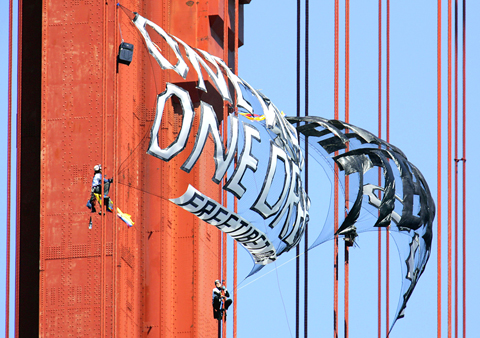Senior Olympic officials yesterday raised the prospect for the first time of abandoning the international legs of the Beijing Games torch relay, amid a wave of protests targeting the flame overseas.
The protests continued on Monday with a dramatic stunt at San Francisco’s Golden Gate Bridge, two days before the torch’s arrival to the city. Police appeared to have been caught cold by the protest, during which demonstrators scooted up the bridge’s cables using climbing gear and unfurled two giant banners.
The torch relay for Beijing and future Games will be reviewed at a meeting of International Olympic Committee (IOC) chiefs in Beijing beginning on Thursday, Gunilla Lindberg, a vice president of the IOC, told reporters.

PHOTO: AP
“I am sure it will be discussed. I think we need to have a full review,” Lindberg told reporters when asked if she thought the IOC would scrap the overseas legs of the Beijing torch relay.
Other senior IOC officials who are in Beijing to prepare for the August Games spoke bitterly of the demonstrations that have marred China’s efforts to stage the most ambitious torch relay ever.
“All I can say is we are desperately disappointed,” IOC board member Kevan Gosper said.
“[Activists] just take their hate out on whatever the issues are at the time,” Gosper said.
Campaigners are trying to raise publicity about Beijing’s controversial rule of Tibet and a wide range of human-rights abuses in China.
On Monday, the torch relay had to be dramatically cut short in Paris due to disruptions by hundreds of protesters. Widespread protests also disrupted the previous day’s leg in London, while activists promised more of the same in Australia, India, Thailand, Japan and elsewhere.
China’s Foreign Ministry yesterday angrily denounced the protests in Europe against the torch relay as “sabotage” by Tibetan separatists.
Gosper and other IOC officials said they would discuss whether to completely abandon the concept of taking the torch around the world for future Games. Gosper said the IOC might prefer a return to a relay program that would see the torch lit in Greece and then transferred to the host country.
Meanwhile, 11 foreign journalists were scheduled to depart yesterday for western China on a tour organized by China’s Foreign Ministry.
The second tour for foreign media of areas that saw mass Tibetan protests recently will fly to Lanzhou, Gansu Province, where more than 1,000 Buddhist monks led protests.
At the end of last month, journalists were taken on a highly regimented three-day trip to Lhasa. Their tour was interrupted by 30 monks at Jokhang Temple, who shouted about the lack of freedom in Tibet and rebutted China’s claims that the Dalai Lama had fomented the riots.
In related news, US Democratic presidential hopeful Senator Hillary Clinton urged President George W. Bush on Monday to boycott the opening ceremony of the Beijing Olympics.
Clinton, in a statement, cited violent clashes in Tibet and the lack of pressure by China on the Sudanese government to stop “the genocide in Darfur.”
“I believe President Bush should not plan on attending the opening ceremonies in Beijing, absent major changes by the Chinese government,” the New York senator said.

CHAOS: Iranians took to the streets playing celebratory music after reports of Khamenei’s death on Saturday, while mourners also gathered in Tehran yesterday Iranian Supreme Leader Ayatollah Ali Khamenei was killed in a major attack on Iran launched by Israel and the US, throwing the future of the Islamic republic into doubt and raising the risk of regional instability. Iranian state television and the state-run IRNA news agency announced the 86-year-old’s death early yesterday. US President Donald Trump said it gave Iranians their “greatest chance” to “take back” their country. The announcements came after a joint US and Israeli aerial bombardment that targeted Iranian military and governmental sites. Trump said the “heavy and pinpoint bombing” would continue through the week or as long

TRUST: The KMT said it respected the US’ timing and considerations, and hoped it would continue to honor its commitments to helping Taiwan bolster its defenses and deterrence US President Donald Trump is delaying a multibillion-dollar arms sale to Taiwan to ensure his visit to Beijing is successful, a New York Times report said. The weapons sales package has stalled in the US Department of State, the report said, citing US officials it did not identify. The White House has told agencies not to push forward ahead of Trump’s meeting with Chinese President Xi Jinping (習近平), it said. The two last month held a phone call to discuss trade and geopolitical flashpoints ahead of the summit. Xi raised the Taiwan issue and urged the US to handle arms sales to

State-run CPC Corp, Taiwan (CPC, 台灣中油) yesterday said that it had confirmed on Saturday night with its liquefied natural gas (LNG) and crude oil suppliers that shipments are proceeding as scheduled and that domestic supplies remain unaffected. The CPC yesterday announced the gasoline and diesel prices will rise by NT$0.2 and NT$0.4 per liter, respectively, starting Monday, citing Middle East tensions and blizzards in the eastern United States. CPC also iterated it has been reducing the proportion of crude oil imports from the Middle East and diversifying its supply sources in the past few years in response to geopolitical risks, expanding

Pro-democracy media tycoon Jimmy Lai’s (黎智英) fraud conviction and prison sentence were yesterday overturned by a Hong Kong court, in a surprise legal decision that comes soon after Lai was jailed for 20 years on a separate national security charge. Judges Jeremy Poon (潘兆初), Anthea Pang (彭寶琴) and Derek Pang (彭偉昌) said in the judgement that they allowed the appeal from Lai, and another defendant in the case, to proceed, as a lower court judge had “erred.” “The Court of Appeal gave them leave to appeal against their conviction, allowed their appeals, quashed the convictions and set aside the sentences,” the judges